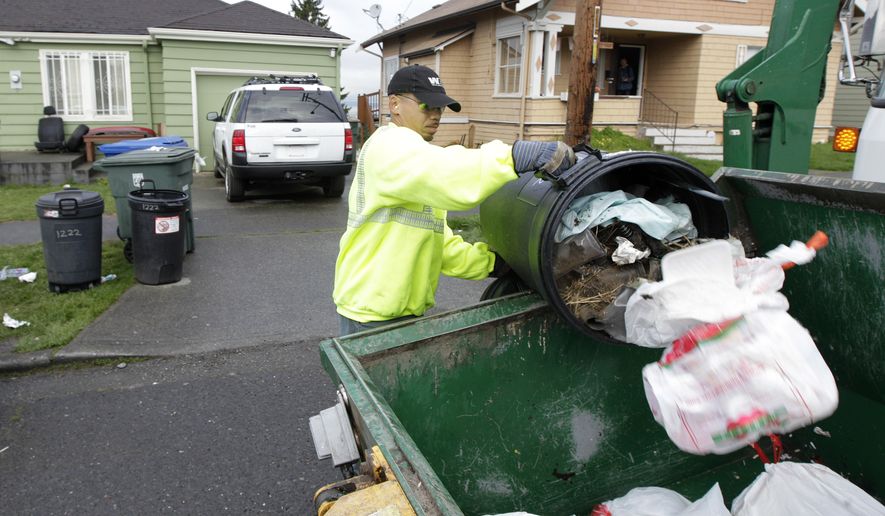A lawsuit filed Thursday accuses Seattle of violating residents’ civil rights by requiring trash collectors to snoop through people’s garbage to check for items such as half-eaten hamburgers and used pizza boxes.
The Pacific Legal Foundation argues in its lawsuit filed in King County Superior Court that the Seattle ordinance prohibiting food waste, which went into effect Jan. 1, “treats state constitutional protections as disposable.”
“While it’s laudable to encourage recycling and composting, the city is going about it in a way that trashes the privacy rights of each and every person in Seattle,” said attorney Brian Hodges, the foundation’s managing attorney at its Pacific Northwest Center in Bellevue, in a statement.
“The city may try to put a happy face on the program, with assurances that it’s not nosy and meddlesome, but the internal documents tell another story,” Mr. Hodges said. “Training documents call for ’zero tolerance’ and show garbage collectors removing bags to inspect a garbage can, peering into translucent bags, and opening torn or untied bags.”
The ordinance prohibits the “disposal of food waste and compostable paper from residential, commercial businesses and customers who haul their own waste” to city dumps, according to the Seattle Public Utilities website.
Garbage collectors are instructed to report residents whose trash contains more than 10 percent food waste or recyclables. Right now the penalty is a warning in the form of a bright red tag on the owner’s bin, but after Jan. 1, residents who throw away too much food or paper will have $1 added to their garbage bill, while apartment and condo owners can be fined $50.
“This law makes garbage collectors the judges and juries,” said Mr. Hodges. “You’re at the mercy of their off-the-cuff estimates about the amount, or percentage, of food waste and recyclables in your garbage can. If their subjective hunch goes against you, you get a fine and/or a brightly colored ’shame tag’ to embarrass you in front of the public.
The lawsuit was filed on behalf of eight Seattle residents, including Steve Davies, who said in a statement that, “Seattle’s garbage law promotes government snooping, and that’s not just offensive, it’s a violation of constitutional protections for all Seattle residents.”
The ordinance is aimed at helping Seattle reach its goal of recycling and composting 60 percent of its waste by 2015. In recent years, recycling has dropped and only 56 percent of waste was diverted in 2013, according to the Seattle Post-Intelligencer.
King County offers homeowners curbside yard waste bins for food and food-soiled paper that are picked up and used for compost.
“Nearly 30 percent of what we throw away in our garbage is recyclable food scraps and food soiled paper — and the average single-family household throws away about 48 pounds of food scraps and food-soiled paper every month,” says the King County Solid Waste Division website under the headline “Recycle More.”
Foundation attorney Ethan Blevins said that not even law-enforcement authorities in Washington are allowed to sift through people’s garbage without a warrant.
“Seattle can’t place its composting goals over the privacy and due process rights of its residents,” Mr. Blevins said. “This food waste ban uses trash collectors to pry through people’s garbage without a warrant, as Washington courts have long required for garbage inspections by police.”
Two other cities, San Francisco and Vancouver, have mandatory composting ordinances but not penalties, said KUOW-TV in Seattle.
• Valerie Richardson can be reached at vrichardson@washingtontimes.com.




Please read our comment policy before commenting.